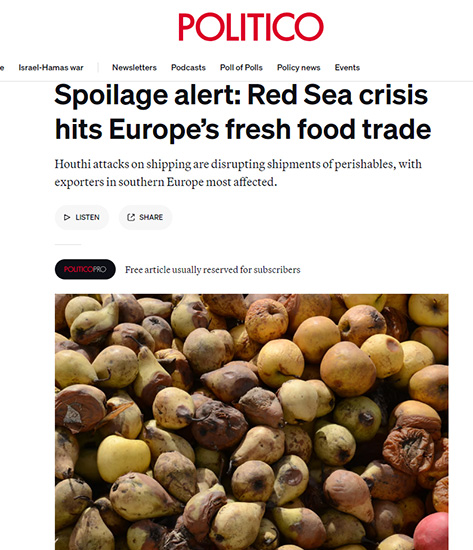
Houthi attacks on shipping are disrupting shipments of perishables, with exporters in southern Europe most affected, notes POLITICO.
When Houthi missiles began raining down on container vessels in the Red Sea last year, European leaders feared a blowback on energy supplies. Three months on, it’s food that is under fire, with exporters and shippers warning of growing damage to the fruit and vegetable trade.
Shipping companies have halted operations through the strait of Bab el-Mandeb and re-routed around the Cape of Good Hope, adding delays of up to three weeks for transport to and from Europe. Besides a five-fold surge in container costs, that means that fresh produce is more likely to rot en route.
“There is significant risk,” Marco Forgione, director general at the Institute of Export & International Trade, told POLITICO, citing a range of product categories beyond fruits and vegetables.
From meat and grains to tea and coffee, if the disruption continues it will “tear into the wider food economy,” he argued. Processing is another weak link, with disordered palm oil deliveries slowing down the preparation of higher-value foods.
Exporters are particularly affected in southern European countries like Italy, Greece and Cyprus. Since their cargoes must now leave the Mediterranean to the west and go the long way round to the Middle East and Asia, many are struggling to get perishables to foreign markets on time, imperiling goods worth billions of euros.
In many cases, the “shelf life of fresh products [does] not allow for lengthening the journey by 15 to 20 days,” Cristian Maretti, president of Legacoop Agroalimentare, which represents Italian farming and food cooperatives, told Ansa.
Yet other products have already been clobbered. Italian exports of apples to Saudi Arabia and the United Arab Emirates, valued at around €400 million per year, were stopped during their peak freshness. So were pears, cabbage and cauliflower. “In a sector dominated by the seasonality of production, the scale of the damage will depend on the duration of the blockade,” noted Maretti.
This has raised concerns that thwarted exports could end up being dumped on the EU market. Inflows of Ukrainian grain have already caused protests across central and eastern Europe, sparking calls to end tariff-free trade with the agricultural powerhouse. Farming giants like Turkey and Egypt are meanwhile joining Ukraine in looking to Europe as either a transit route or a destination for their perishable foods.
Non-perishables have fared much better, with holdups for wheat and rice only causing headaches rather than empty bellies. Wines and spirits may struggle to reach Asia before Chinese New Year on February 10, but demand is fairly stable.
Frozen Belgian fries were the main item going scarce in Arabian countries, said a spokesperson for Maersk, the world’s largest shipping company.
Drought is holding up traffic through the Panama Canal and, with logjams at the Bosphorus and other strategic chokepoints, the EU is entering “a period of incredible instability and uncertainty in global supply chains,” he told POLITICO.
read more in our Telegram-channel https://t.me/The_International_Affairs

 11:35 30.01.2024 •
11:35 30.01.2024 •






















